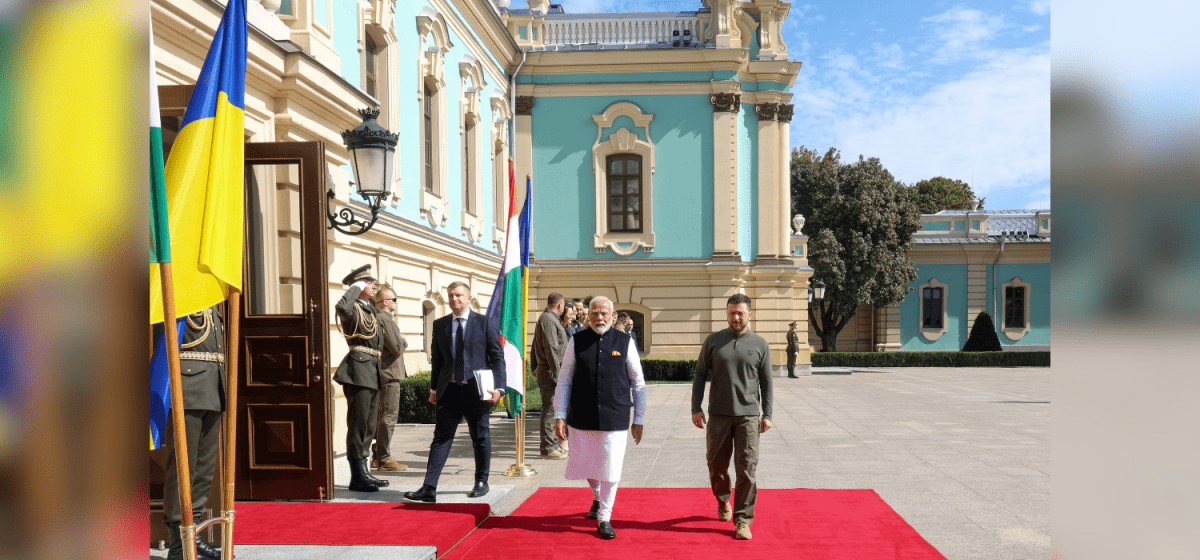
Even by the low standards of Prime Minister Narendra Modi’s foreign visits, which have been notable more for photo opportunities than actual achievements, the results of his Ukraine visit were insignificant. No major trade deal was announced—the train of privileged capitalists was conspicuously absent—nor was any strategic agreement or diplomatic breakthrough achieved.
Foreign policy is about advancing domestic priorities (security, wealth and the well-being of citizens) on the world stage, and yet the first trip by an Indian prime minister to Ukraine in modern history delivered nothing on these fronts. Of course, it is hard to see how there would have been any chance in this regard from the start. Ukraine is in the midst of a devastating war following the Russian invasion. Its economy and military are critically dependent on support from the US and the EU. It has little to offer at such a time, and if it did, the US and the EU would be first in line. To expect a deal that would benefit India’s domestic needs in such circumstances would be illusory.
Of course, there are the issues of war and peace. Ending the conflict between Russia and Ukraine is in India’s strategic interest. For a poor country that does not export weapons in any significant quantity, any outbreak of hostilities is costly to Indian interests. Not only do we lose the opportunity to trade, but we also have to evacuate our citizens from war zones, and they lose opportunities in education and employment that are not available in the domestic economy.
There was much talk about the possibility that Modi’s visit could help push for an end to the war between Russia and Ukraine, and Modi himself pitched himself for the role of peacemaker, saying: “I want to assure you that India is ready to play an active role in any effort towards peace. If I can play any role in this personally, I will do so. I want to assure you of this as a friend.”
The harsh reality, however, is that Modi cannot really play a significant role. Just a few months ago he was in Russia, hoping to convince Putin to have the Russian military release Indians duped into serving in the war. The Russians listened and made some conciliatory gestures, but there has been no exodus of war-weary Indians returning from someone else’s war. If this is the extent of Modi’s influence as far as Indian citizens are concerned, one can only imagine how minuscule it is when it comes to a war that Putin has defined in existential terms.
Perhaps if India had spoken on behalf of a broader group, say on behalf of the Global South, and laid out how developing countries have had to pay high costs through food inflation and disruptive markets, there would have been some value. India could have leveraged its historical position as one of the leading countries of the non-aligned movement to argue on issues important to the world at large.
But Modi made no such effort or commitment, and it would have been a bad time to do so. Ukraine’s recent statement that it had provided intelligence to jihadists in Mali, which led to the deaths of a significant number of Malian security mercenaries and Russia’s Wagner Group, has generated significant repercussions in Africa. Senegal recalled the Ukrainian ambassador for a reprimand, and Mali cut ties with Ukraine.
In the end, Modi’s bland statements about the need for peace were little different from those of China, which has far more influence with Russia, and whose leader was not embracing Ukrainian President Volodymyr Zelenskyy as Ukraine expanded the war into Russian territory.
How do the US and Bangladesh fit into India’s scheme of things?
So if not for domestic gains or international influence, why was Modi in kyiv?
A clue can be found in the disclosure of details of a phone call between US President Joe Biden and Modi, just a few days after Modi’s visit to Ukraine. While the White House statement only spoke about Modi’s visit to Ukraine (and Poland), Modi’s tweet on the subject emphasised the situation in Bangladesh as well.
A cynical reading would be that Modi was trying to get some goodwill from the US for his trip to Ukraine to ask for help in handling its Bangladesh policy mess. By all accounts, it was the US that was pushing for more substantive democracy in Bangladesh, while India was bent on supporting the increasingly authoritarian and discredited government of Sheikh Hasina. Now India is reeling in its own neighbourhood and desperately seeking support.
To be fair, India remains a major player despite a number of diplomatic setbacks under the current regime. The size of its economy, which grows despite the government in most cases, makes it an important international player for any country that wants to have on its side.
A successful foreign policy might have used this influence to create greater opportunities for Indians, but under this regime, it seems to have been reduced to providing photo opportunities for Modi hugging foreign leaders (as a friend pointed out, Modi does not hug any Indians, not even his ostensible allies) and cleaning up after his mistakes.
Note: This article is republished from The Wire through a cooperation agreement between both parties for the dissemination of journalistic content. Original link.
Omair Ahmad is the South Asia Editor at The Third Pole. He has worked as a political analyst and journalist, with a focus on the Himalayan region. He is the author of a political history of Bhutan and several novels.
Source: https://reporteasia.com/opinion/2024/08/28/visita-narendra-modi-ucrania-estados-unidos/

